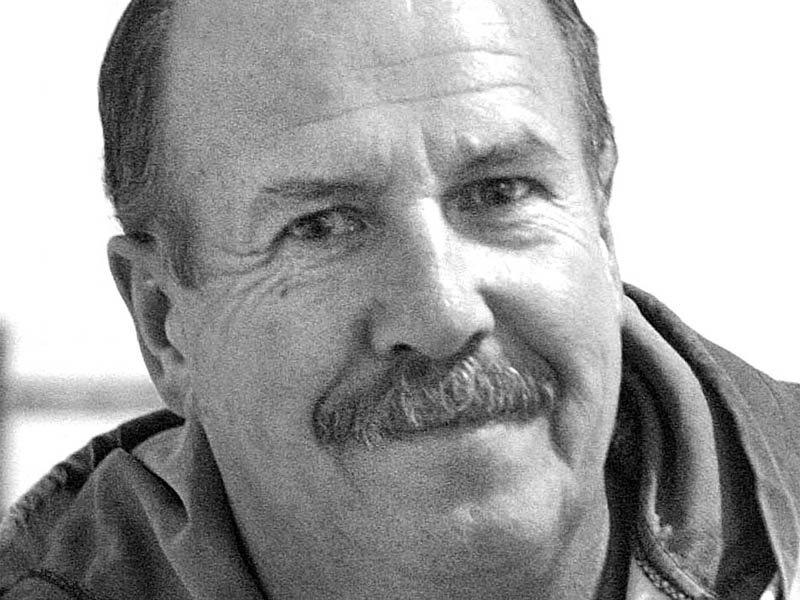Columnists
My dinner with Jacques


Senator Jacques Demers and James Hurst
Senator Jacques Demers recently spoke to a group of businessmen in Belleville. Now approaching his 67th birthday, he spends a little time nowadays on the road, sharing a message or two with anyone who cares to listen.
To say that he has had a fascinating trip to the present is a serious understatement.
He was appointed to the Canadian Senate by Prime Minister Harper on August 27, 2009. At that time, more than a few questions arose regarding the appointment. Most hockey observers knew that he had coached for many years.We had heard his analysis on television during intermissions. Other than that, we knew very little about the man.
In 2005, Demers revealed that he was “functionally illiterate.” In essence, he was incapable of reading anything of significance. In his address to the Belleville Men’s Sales and Ad Club, he admitted that he could decipher sufficiently to get by, to get the significance of a newspaper article, for example.
The crux of the matter stemmed from a difficult childhood. “My father was an alcoholic,” he said, “and he was abusive. He was always telling me that I was stupid, and dumb. It was very difficult for me to grow through that. Then my mother died of leukemia when I was 16. That made it really tough.”
Demers remembered the trouble he had at school. He was terrified, and anxious. “I was a loner. I did not want to deal with people. I never liked being judged by other people.” As a result, he slipped through the educational cracks in Quebec and became successful as a hockey coach, unable to read.
He began his coaching career in the minor ranks in Quebec, and caught on with the Indianapolis Racers of the World Hockey Association. He coached the Cincinnati Stingers in 1977-1978, then headed to Fredericton to coach the Express in the American League. He coached the Chicago Cougars and the Quebec Nordiques in the WHA.
The Nordiques then entered the NHL, with Demers at the helm. He followed that stint with years in St. Louis, Detroit, Montreal, and Tampa Bay. He coached the Habs to a Stanley Cup victory in 1993.
Demers always insisted upon respect from his players as a coach. “Three things are most important,” he told the gathering. “Character, discipline, and drive.”
When he took over the Red Wings, they were in rough shape. “The Dead Wings,” he called them. They had not been in the playoffs for seven years in a row. He asked the players to “pay the price”, and to “make the commitment to success”. At that time, he knew he needed a leader for his team. He did not have to look too far. Steve Yzerman was ready for the task. After the Wings’ first training camp in Flint under Demers, changes were in order. “I told them that I did not care if they liked me. I told them that they must not think that any of them is bigger than the team. I knew I had to get rid of some of them, even a 40-goal scorer. One player threw his sweater on the floor, in disgust. It did not take me long to get rid of him.”
Demers believes that adversity can bring out the best in people. In a series against the Nordiques, the Wings lost the first two games. He then told his players: “Now we have them exactly where we want them.” There was a little doubt; however, the Nordiques took the Wings lightly, the Wings dug deep, and they won the next four games.
Demers excused himself quickly after his speech. The “tweeters” in the crowd told him the Habs were ahead of the Bruins 2-1 in the second period of the sixth game. He just had to watch the rest of the game. He answered a question about the former Belleville Bull P. K. Subban. “I know that he has had a tough time occasionally this year.” He said that Subban has had to deal with a lot of different issues, some with racial undertones. But Demers did predict that some day Subban will win the Norris Trophy as the best defenceman in the NHL.
In an interesting twist to his life, he revealed that he reads quite well now, but that he learned to read English before French. He recognized the efforts of his Anglophone wife.
He finished by telling the group that winning the Stanley Cup was “the icing on the cake,” then bolted for the exit to watch his beloved Habs. His big disappointment came a day later, when the Habs were eliminated. No worries. Still lots of great hockey to follow!

Comments (0)